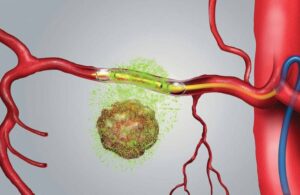
The Tiger-Pac clinical trial investigates RenovoGem as a potential treatment option in locally advanced pancreatic cancer (LAPC). Interim data from the Phase III open-label study suggests a six-month potential improvement in median overall survival with RenovoGem.
RenovoGem utilizes the RenovoRx proprietary RenovoTAMP therapy platform. It provides targeted intra-arterial delivery of FDA-approved chemotherapy, known as gemcitabine. This treats LAPC following stereotactic body radiation therapy (SBRT). The pressure-mediated delivery technology delivers the therapy locally, across the arterial wall to bathe tumor tissue in chemotherapy.
The study compares RenovoRx treatment with standard of care systemic IV administration of gemcitabine and nab-paclitaxel. This standard of care has a seven-week survival benefit and a $1 billion addressable market, according to a news release.
“We are pleased with the promising readout of our study’s first interim analysis, and we extend our sincere and continued strong appreciation to all the patients, investigators, and team members involved in reaching this important milestone,” said Shaun Bagai, CEO of RenovoRx. “Based on these data, we will continue our ongoing clinical trial to collect more data to support our new drug application. Our team intends to engage further with the FDA to facilitate an expeditious path forward for our treatment platform.”
About the RenovoRx Tiger-Pac clinical trial results
This, the first of two interim analyses, indicates that the study is on track to demonstrate increased lifespan for patients treated with RenovoGem. RenovoRx plans to conduct final analysis after 86 protocol-specified events occur in the SBRT population. It planned this, the first analysis with 30% of deaths reported, followed by a second with 60% reported. RenovoRx expects the second to come in 2024.
RenovoRx designed Tiger-Pac to randomize 114 patients (57 in each arm) with all patients receiving upfront induction chemotherapy and SBRT. As of the date of the analysis, the trial randomized 45 patients across U.S. sites. The company said it randomized 23 patients to RenovoGem treatment and 22 to standard of care. It observed an equal number of primary events (13) in each arm.
The median overall survival in the standard of care arm came in at 10 months compared to 16 months in the RenovoGem arm. Both arms’ median survival calculations do not include 4-5 months of life since diagnosis during the induction chemotherapy and radiation phase of the trial.
Additionally, RenovoRx observed a positive trend in median overall survival by six months. The study failed to reach statistical significance to stop the trial early, though.
Dr. Michael J. Pishvaian, the principal investigator, said the study results “provide hope for a potentially improved” treatment option.
“Results from the interim analysis echo those of the Phase I/II and observational studies,” said Pishvaian. “The data suggests that RenovoGem has the potential to enhance patient survival. This is important because treatment of locally advanced pancreatic cancer is often limited to systemic, high dose IV chemotherapy treatment, which often comes with debilitating side effects to patients.”

